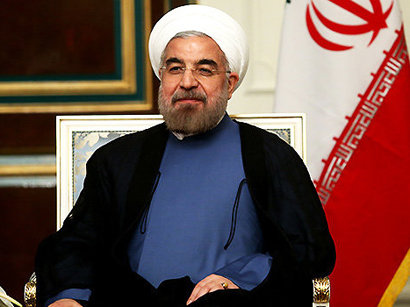Tehran refuses U.S. demand for U.N. visit to military sites

By Ali Mustafayev
The situation around the Tehran-Washington relations continues to heat up, as Iran has dismissed a U.S. demand for United Nations nuclear inspectors to visit its military bases.
Iranian President Hassan Rouhani said that the U.S. demand for U.N. nuclear inspectors to visit the country's military facilities were unlikely to be accepted by the nuclear watchdog.
"The International Atomic Energy Agency (IAEA) is very unlikely to accept America's demand to inspect our military sites," Rouhani said in a televised interview on August 29.
The announcement was referring to the statement made by the US Ambassador to the UN, Nikki Haley, last week. Haley pressed the IAEA to seek access to Iranian military bases to ensure that they were not concealing activities banned by a 2015 nuclear deal reached between Iran and six major powers.
Spokesman for the Islamic Republic Mohammad Baqer Nobakht, commenting on the issue, earlier said that Iran's military sites are off limits.
"All information about these sites is classified. Iran will never allow such visits. Don't pay attention to such remarks that are only a dream,” he said.
The Iranian side assessed the act as an attempt by the U.S. to undermine the Joint Comprehensive Plan of Action.
Iran and the United States have often accused each other of violating the “spirit” of the nuclear deal.
Washington started its new sanctions campaign against Iran following President Donald Trump took the office. Trump has repeatedly called the nuclear pact -- negotiated under his predecessor Barack Obama -- "the worst deal ever". In April, he ordered a review of whether a suspension of nuclear sanctions on Iran was in the U.S. interest.
The Trump administration announced sanctions in July related to Iran’s development and testing of missiles, along with its support for Syria’s government and software theft. It further penalized Iran with more sanctions after Iran launched a satellite into orbit.
As a response to the sanctions imposed by the U.S., the Parliament of Iran approved a bill on allocation of funds for the development of its missile program. The bill mandates the government to allocate an additional $260 million for the "development of the missile program" and the same amount to the Revolutionary Guards's foreign operations wing.
Iran and the five permanent members of the United Nations Security Council – the United States, the United Kingdom, France, China and Russia – plus Germany signed the nuclear deal on July 14, 2015 and started implementing it on January 16, 2016.
The agreement limits Iran’s nuclear activities in exchange for, among other things, the removal of all nuclear-related bans against the Islamic Republic.
The US Congress requires the administration’s certification (every 90 days) of Iran’s compliance with the nuclear deal. Trump’s administration has already declared Iran in compliance, as required by law, twice during his tenure.
Iran refuses accusations and argues that there is no danger in its missile testing and that each country has rights to improve its defense system.
---
Follow us on Twitter @AzerNewsAz
Here we are to serve you with news right now. It does not cost much, but worth your attention.
Choose to support open, independent, quality journalism and subscribe on a monthly basis.
By subscribing to our online newspaper, you can have full digital access to all news, analysis, and much more.
You can also follow AzerNEWS on Twitter @AzerNewsAz or Facebook @AzerNewsNewspaper
Thank you!
